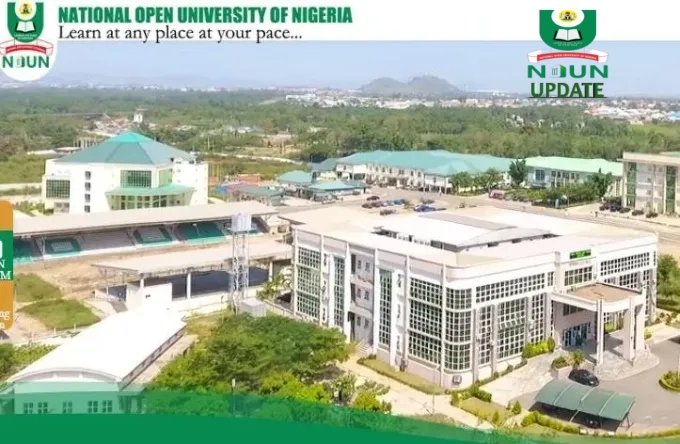
The evolution and the subsequent incursion of technology into the educational landscape has continued to bear an unprecedented result in enhancing the learning experience of students, especially as the global community increasingly becomes subservient to the technological transformation.
And that is why Nigeria is seen by its sub-regional countries as clever enough to foresee and move swiftly in establishing the Open and Distance Learning (ODL) institution decades ago, which is now becoming a force to be reckoned with in all parts of the world.
Additionally, ever since the establishment of the National Open University of Nigeria (NOUN) more than three decades ago, the institution has not looked back in delivering its mandeate, plugging the otherwise wide gap in the nation’s tertiary education system.
How did the university achieve this tremendous success, so much so that countless number of neighbouring countries, sister institutions and other relevant stakeholders continue to understudy the success story of NOUN? Well, the answer is not far-fetched.
A strong system was set up, which is being sustained through the directorates and units which are directly impacting on the students’ learning processes.
Sections such the Directorate of Learning Content Management System (DLCMS), Directorate of Management Information System (DMIS), Directorate of Academic Planning (DAP) and a host other relevant academic directorates have direct bearing in the life of NOUN students and they, in one way or the other, make the students to sit up.
For instance, the routine operations of the DLCMS mean that students are being offered a 24-hour quick and secure online access to course and study materials anywhere they are and at their convenience. For anyone of them to access that, one needs to have a more than basic computer knowhow.
Students have also been given the platform to engage in impactful and effective learning, which is delivered on mobile devices such as smartphones, tablets, notebooks, Personal Digital Assistants (PDAs), among others.
As a matter of fact, this directorate also provides students with facilitated and lecturer-led flexible learning, where students can connect and communicate with e-facilitators, e- councillors and technical support teams.
More so, online/virtual classrooms and laboratories are also created, where students can participate in real-time as concepts are explained. This creates an avenue to collaborate with course participants within and across study centres.
DLCMS, from the onset, has been ensuring that the 21st Century digital skills for the
improvement of staff and students is constantly achieved. In ODL, the relevance of this ICT-driven directorate is quite numerous and similar to the Directorate of Management Information System (MIS), which is another strong ICT-driven directorate.
MIS is one of the directorates that impacted NOUN students’ enhanced learning. The directorate manages the institution’s students’ information, data and details, while it also tries to achieve a level of automation for the institution.
MIS deals with the collection of hardware, software, data and information that provides other directorates with the tools for organising, evaluating and efficiently running their directorates. This can be seen in Student Information System (SIS), Library Information System, Faculty Information System and Finance System.
A student information system is responsible for managing student’s data within the faculty and university. A typical students record includes name, age, gender, address, email address, username, faculty and department. It provides these systems so that a learner can get a student profile. They keep students record organised and safe. They make it easier for students to pay fees, register courses and even download course materials.
These have made students who didn’t start their stint with the university with any form of computer literacy become quite good with computers and technology before the end of their schooling year. In recent times, updated innovations for the students’ technological development as well as the smooth running of such portals were introduced. The Directorate has also made these systems beginner friendly so students with no computer literacy can find it easier to use.
The library information system, a component of MIS, is responsible for managing and automating libraries within faculties and university. Automated libraries are libraries that are available in digitised form. They give students access to information about availability of books and the digital books themselves.
Though the MIS manages information for the institution, it has invariably also helped in students’ technological growth since every stage of their processes is done through the internet.
Now, directing the spotlight on the Directorate of Academic Planning (DAP), which is responsible for all academic planning in the institution, the story is the same.
Established in 2010 to be the springboard for enthronement of best international practices for qualitative higher education in the NOUN, DAP’s mission is to be the repository of statistics and planning, quality assurance and enforcement of compliance with the National Universities Commission’s (NUC) academic standards. They launch new academic programmes and ensure that the curriculum is in conformity with ODL before it is submitted to the NUC. The directorate guides and monitors the university’s academic activities in accordance with the statutory goals, mission and vision of the university.
DAP ensures adequate provision of a conducive teaching, learning and research environment for staff and students. It liaises with the NUC on matters pertaining to academic standards and accreditation. It carries out extensive audit of existing academic programmes to ensure that they comply with NUC regulations. It supplies students’ data to the NUC when required. In order to reposition the directorate, Senate at its 91st meeting approved the reorganisation of the directorate to five units to be headed each by senior academics. The units are: Academic Standard, Monitoring and Evaluation, Data Management and Statistics, Quality Assurance and Strategic Planning.
Unarguably the engine room of the academic programmes of the university, DAP continues to streamline anything necessary for the academic standard of the university’s programmes. As such, it generates staff and students’ data for effective planning, undertakes or plans for the accreditation of programmes and produces the academic brief of the university.
The directorate also rationalises and regulates unapproved programmes, conducts workshops for Deans, Deputy Deans and Heads of Departments of NOUN, especially on Curriculum Design, conducts Mock Accreditation and restructures its own operations for effective services.
Indeed, NOUN’s modus operandi means that its students not only end up molded in character and learning, as is found in most university education in the country but go a step further by becoming computer and technology savvy, a latent benefit acquired and internalised during the course of one’s stay in the university.
Ikechukwu O.

ExCorp

ExCorp

ExCorp

ExCorp

ExCorp

ExCorp

ExCorp
The National Open University of Nigeria (NOUN) has been ranked 1st in Nigeria for online learning by the Webometrics Ranking of World Universities...
Continue Reading



